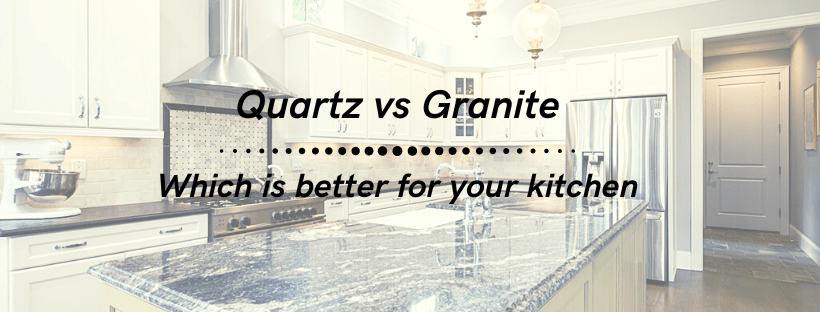Quartz vs Granite: Which One Is Better For Your Kitchen
Quartz vs granite are the two countertop options that have their own unique qualities and characteristics that make them popular choices among homeowners. When it comes to selecting the ideal material for your countertops, the timeless debate of granite vs quartz often takes center stage. The choice between the two can significantly impact your kitchen or bathroom’s aesthetics, durability, and overall cost.
In this article, we’ll explore some of the key aspects of this important question, ranging from quartz vs granite countertops in their durability, appearance, and pricing, to heat resistance. Additionally, we’ll address some frequently asked questions about these two types of kitchen countertops to help you make an informed decision when determining which countertop is the best value for you and your family.
Contents
Quartz vs Granite Countertops
Choosing between granite and quartz countertops depends on various factors that include your personal preferences, lifestyle, budget, and maintenance considerations. When choosing the right one for your kitchen, consider the look you want for your space. Granite offers a natural, unique appearance with variations in color and pattern, while quartz provides a more uniform and engineered aesthetic. It would be great to determine which style complements your kitchen or bathroom better. Both materials are durable, but quartz is more resistant to stains, scratches, and acids due to its non-porous surface. If you have a busy kitchen or prefer low-maintenance surfaces, quartz may be the better choice.
Granite is exceptional at withstanding high heat, which is why it is great for cooking areas. Quartz is heat-resistant but can be damaged by extreme heat, so use heat-resistant pads or trivets. Consider your budget, including not only the initial cost but also long-term maintenance expenses. Granite may have a lower upfront cost, but it requires sealing and can be more susceptible to staining.
Quartz offers extensive customization options, allowing you to select from a wide range of colors and patterns. But granite’s appearance is natural and unique to each slab. If environmental impact matters to you, it’s good to know that quartz often incorporates recycled materials, making it a more eco-friendly option.
Think how much time you have on your hands to maintain and care for the countertops. Granite demands regular sealing, while quartz is low-maintenance and doesn’t require sealing. Both materials can increase the resale value of your home, but the final choice depends on your taste, needs, preferences, and budget.
Here are the main characteristics of these two materials.
Main Characteristics of Quartz Countertops
Quartz is a material made of crystalline minerals composed of silicon and oxygen atoms. Its main characteristics include exceptional hardness, scoring 7 on the Mohs scale, making it resistant to scratching and abrasion. Quartz crystals are typically transparent and have a hexagonal structure.
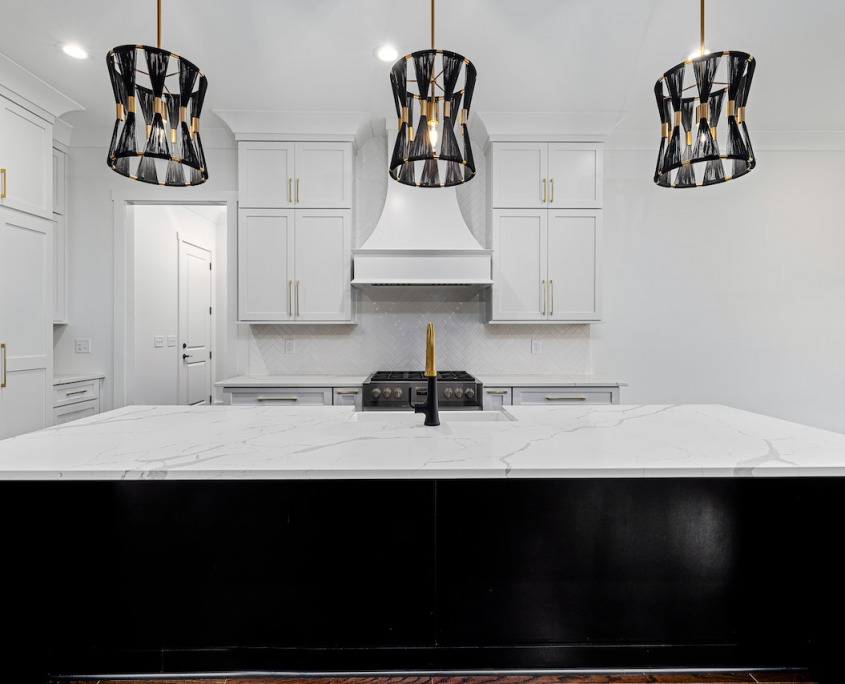
Quartz can be found in abundant amounts in nature and comes in a wide range of colors and varieties, making it a valuable component in industrial uses. Its unique combination of hardness, transparency, resistance, and beauty makes it indispensable in many fields, especially for engineering kitchen countertops and other surfaces in the home. Quartz is, in the kitchen, usually paired with white shaker cabinets and used often in modern kitchen cabinet ideas.
Main Characteristics of Granite Countertops
Granite is a natural igneous rock known for its distinct characteristics. It’s primarily composed of quartz, feldspar, and mica, resulting in remarkable hardness and durability. Granite is resistant to scratching, heat, and staining when properly sealed, making it an excellent choice for countertops and flooring.
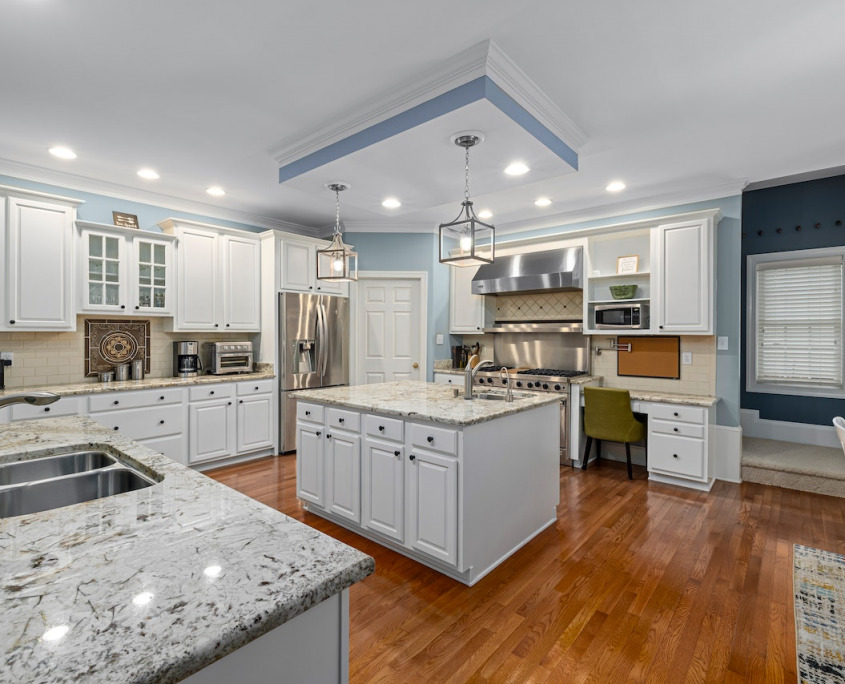
Its appearance is characterized by unique patterns and speckles, as each slab is one-of-a-kind due to geological variations. Granite comes in a wide range of colors, from earthy tones to vibrant hues, making it versatile for various design applications. Its longevity, natural beauty, and resilience to wear and tear are some of its standout characteristics, prized in both residential and commercial settings. When it comes to kitchen style, granite is most commonly seen in farmhouse kitchen ideas and paired with traditional kitchen cabinets.
Granite vs Quartz Pros and Cons
Here are the main pros and cons of these two materials listed to help you choose between them more easily.
Pros of Quartz Countertops
Quartz countertops offer numerous advantages. They are exceptionally durable and resistant to scratches, stains, and heat. Their non-porous surface means they don’t require sealing, making maintenance a breeze. Quartz countertops, like Caesarstone, are also highly customizable, with a wide range of colors and patterns available to suit any design aesthetic. They are more environmentally friendly than some natural stone options, because of the recycled materials in the material. Additionally, quartz is highly hygienic, as its smooth surface doesn’t harbor bacteria. Quartz’s consistent appearance appeals to those seeking a uniform, modern look in their kitchen or bathroom, making quartz a popular choice for both aesthetics and practicality.
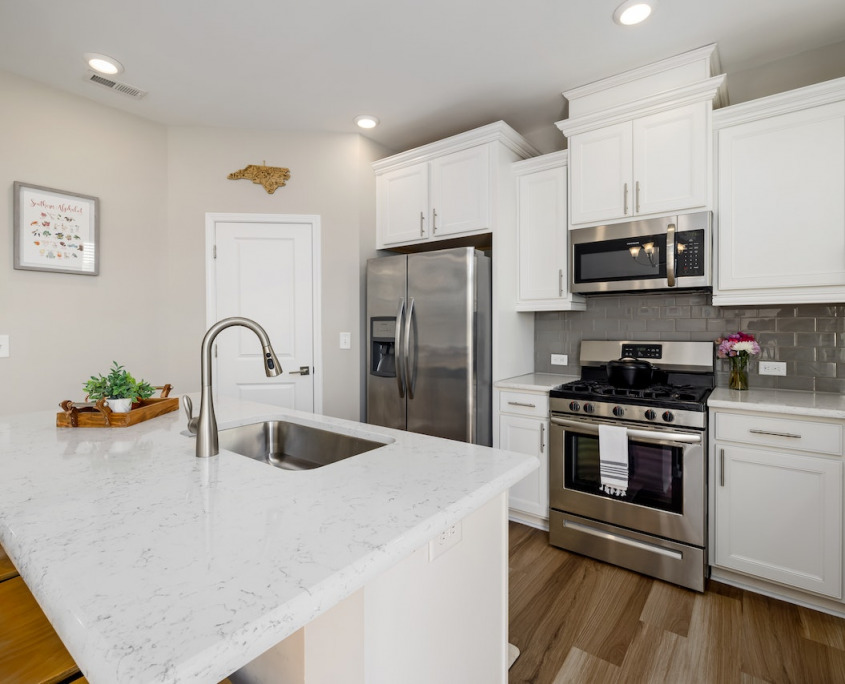
Cons of Quartz Countertops
Despite their numerous advantages, quartz countertops have some drawbacks to consider when choosing the right countertop for your kitchen. One notable con is their relatively high cost compared to some other countertop materials. Also, while it’s durable, quartz can be less heat-resistant than natural stone options like granite. Although quartz countertops are resistant to stains, harsh chemicals can damage the resin-based surface. Additionally, quartz countertops may not have the same natural aesthetic appeal as granite or marble, which some homeowners prefer. Also, their engineered nature may not align with those seeking entirely unique, natural materials for their kitchen or bathroom surfaces.
Pros of Granite Countertops
Granite countertops come with several compelling advantages. They exude timeless natural beauty, with each slab featuring unique patterns, movements, shades, and colors. Their exceptional durability and heat resistance make them a preferred choice for high-traffic kitchens. Granite can significantly boost a home’s resale value due to its premium and enduring appeal. While requiring regular sealing, granite maintenance is relatively simple and cheap. It stands up well to stains and scratches when properly cared for. Also, its eco-friendliness lies in its longevity, as it doesn’t require frequent replacement. Granite countertops are a classic choice that combines aesthetics, durability, and potential for a solid return on investment.
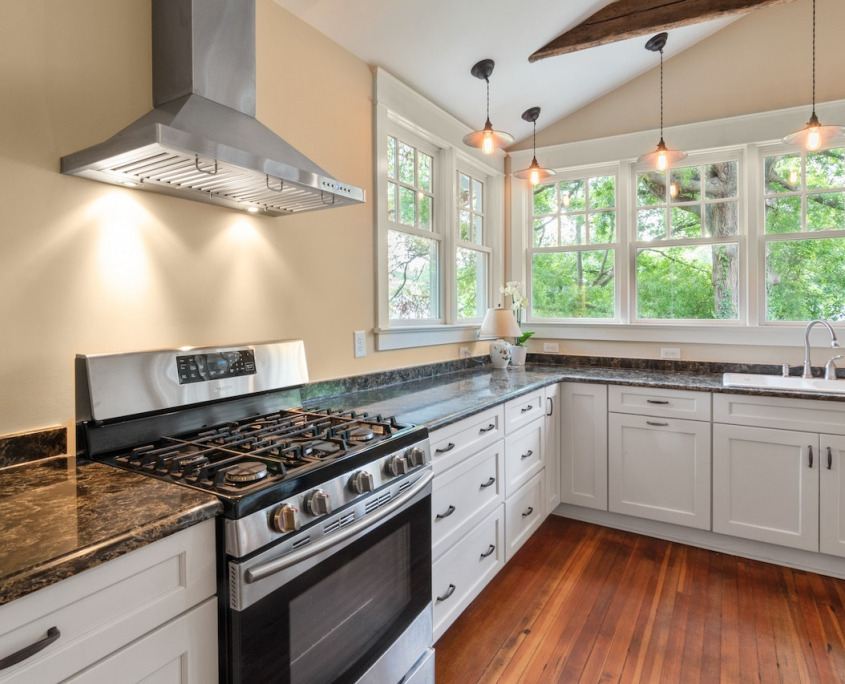
Cons of Granite Countertops
Granite countertops, while renowned for their beauty and durability, come with a few drawbacks. They require regular sealing to maintain their stain resistance, which can be an ongoing maintenance cost and effort. Granite is a porous material, which means it can harbor bacteria if not sealed and cleaned properly. The natural stone’s weight and thickness can make installation more complex and costly. While heat-resistant, granite may still be susceptible to chipping or cracking under heavy impact. The variety in appearance can be seen as a drawback for those seeking a uniform or consistent look, as each slab is inherently unique.
Quartz vs Granite Durability
When talking about kitchen countertops and looking for the best options for your kitchen, durability is one of the main and most saught-after qualities. Without durability, even the prettiest countertop won’t last long and won’t serve you the way it should.
Quartz Durability
These countertops boast remarkable durability thanks to their engineered composition. They are highly resistant to scratches, stains, and heat. A great example of these qualities are Quartz Master Countertops. The combination of natural quartz crystals and resin forms a non-porous surface that prevents liquids and stains from penetrating the surface. Unlike natural stones like granite, marble, or quartzite, quartz doesn’t require sealing, which simplifies maintenance. This durability makes quartz an ideal choice for high-traffic areas like kitchens and bathrooms. However, it’s important to remember that extreme heat can cause damage to quartz countertops, so using trivets or hot pads for hot cookware is needed.
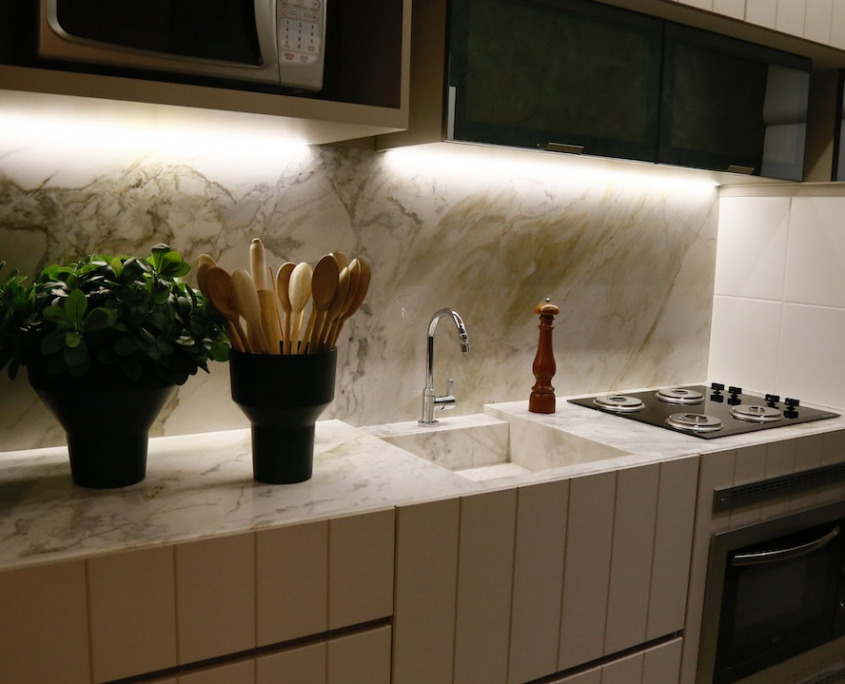
Granite Durability
While granite is durable, it demands more care than quartz to preserve its look. It can chip or crack when impacted by heavy objects, while proper and regular sealing is vital to prevent staining. Granite countertops are renowned for their exceptional durability. As a natural igneous rock, granite is incredibly hard and resistant to scratching, making it ideal for busy kitchens. When properly sealed, granite is highly resistant to staining, though unsealed or poorly maintained surfaces may be susceptible to stains. Granite’s heat resistance is outstanding. It allows the stone to endure hot cookware without damage. However, granite can chip or crack under heavy impacts, so take great care when dealing with heavy objects. With proper maintenance, including regular sealing, granite countertops can last for decades, maintaining their beauty and functionality for many years to come.
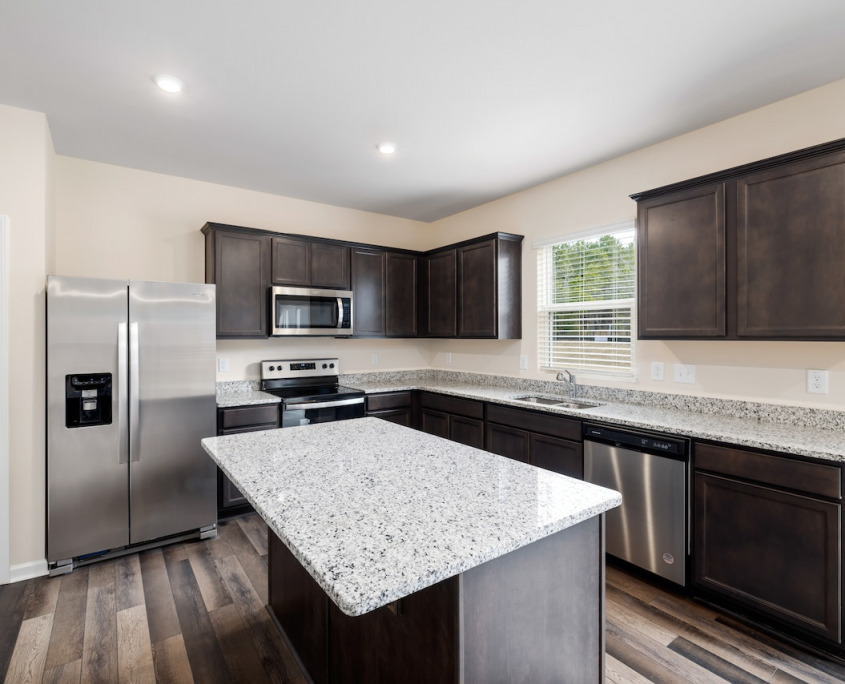
Granite vs Quartz Appearance
The appearance of a kitchen countertop is very important to any homeowner. Their appearance will help you design a more beautiful kitchen and more easily combine different kitchen elements, compiling a cohesive kitchen design. Quartz and granite carry overall different looks that are well-loved among homeowners.
Quartz Countertop Appearance
Quartz countertops offer a versatile appearance that appeals to a wide range of design preferences and kitchen styles. They are engineered using natural quartz crystals mixed with resin and pigments, allowing for extensive customization. With a vast array of colors and patterns available, quartz can mimic the look of natural stone or offer bold, contemporary designs, just like MSI Countertops quartz options do. The engineered nature of quartz ensures a consistent appearance, devoid of the natural variations found in materials like granite, which allows for a uniform appearance. This uniformity appeals to those seeking a sleek, modern, or minimalist aesthetic in their kitchens or bathrooms. Their contemporary look pairs amazingly well with many modern kitchen cabinet colors. Whether you prefer the look of marble, granite, or unique patterns, quartz offers a customizable solution.
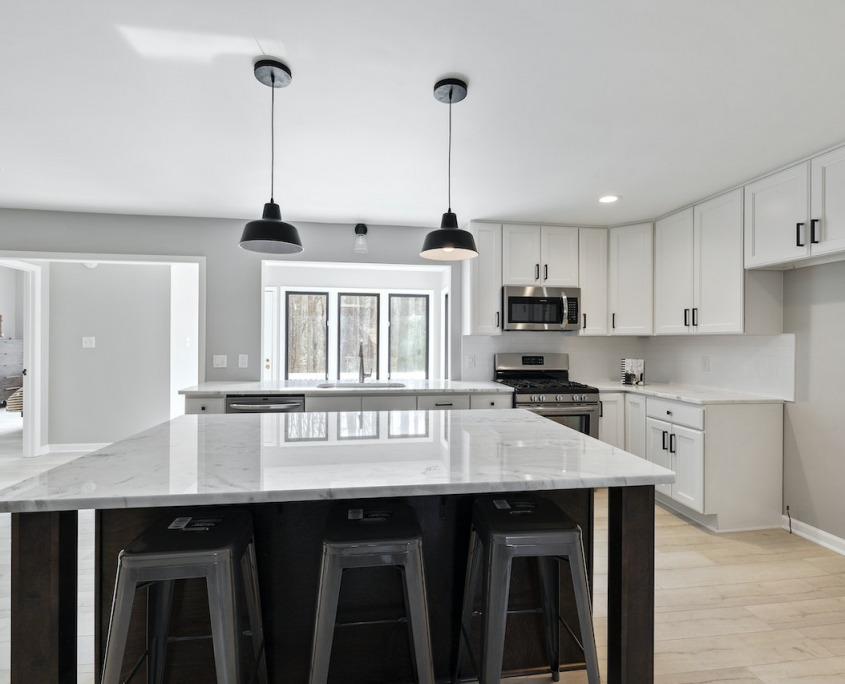
Granite Countertop Appearance
Granite countertops are celebrated for their natural and distinctive appearance. Each slab of granite is a unique work of art, with intricate patterns, veining, and a wide spectrum of colors. The stone’s composition of minerals like quartz, feldspar, and mica creates captivating textures and speckles that can complement a variety of design styles, from traditional and classic to modern. Granite’s natural aesthetic often brings a touch of elegance and sophistication to any space. They are magnificent upgrades and fit with the most popular cabinet door styles. Its timeless beauty and the sheer variety of available patterns make it a favored choice for those who appreciate the charm and individuality of natural stone in their kitchen or bathroom.
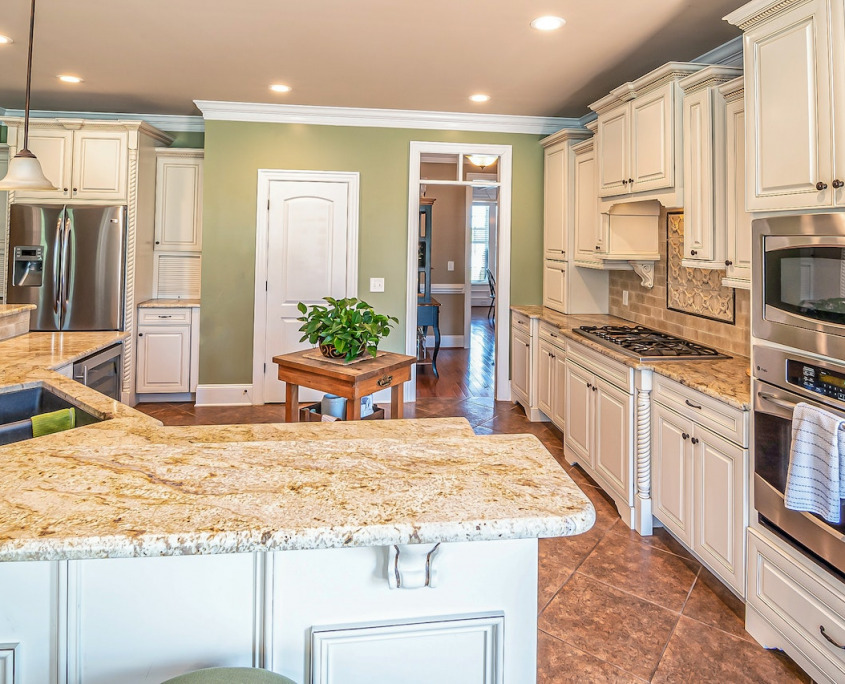
Granite vs Quartz Heat Resistance
Heat resistance is one of the most important qualities of any type of kitchen countertop. Here are the main differences and similarities in heat resistance between quartz and granite explained.
Quartz Countertop Heat Resistance
Quartz countertops are moderately heat-resistant, but they still require caution when exposed to high temperatures. The engineered nature of quartz involves resin, which can be sensitive to extreme heat. While they can withstand everyday kitchen activities like placing warm pots and pans directly onto the surface, prolonged or direct exposure to extreme heat sources, such as red-hot cookware or heated appliances will most likely cause thermal shock and damage the resin, which will then lead to discoloration or even cracking. To preserve the appearance and longevity of quartz countertops, use heat-resistant pads or trivets when dealing with high-temperature items. This is how you’ll minimize the risk of possible damage.
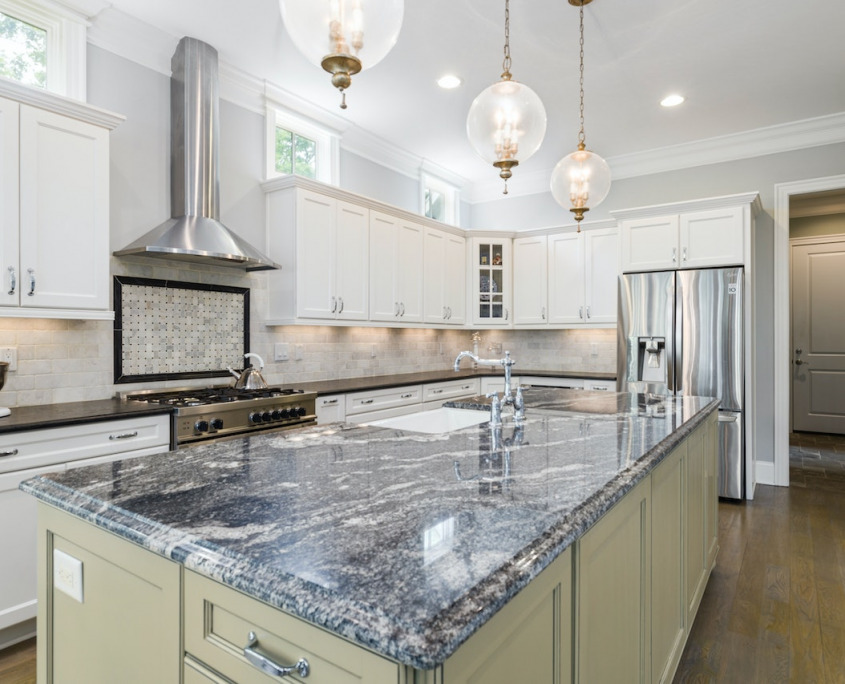
Granite Countertop Heat Resistance
Granite countertops are renowned for their exceptional heat resistance. This natural stone can withstand high temperatures without suffering damage or discoloration. Whether you place hot pots, pans, or baking sheets directly onto the surface, granite’s heat resistance is reliable, making it a practical choice for busy kitchens where cooking often involves heat-intensive activities. However, it’s very important to remember that extreme, prolonged exposure to high heat can still cause thermal shock and potentially lead to cracks, just like with quartz, so we also advise using trivets or hot pads to protect the granite surface and ensure its longevity.
Quartz vs Granite Price
When determining quartz vs granite cost, make sure to take into consideration all of their pros and cons, qualities, and disadvantages. Summed together, they will point you in the right direction.
Quartz Countertop Price
Quartz countertop prices vary based on factors like brand or manufacturer, color, finish, slab thickness, edge profile, and installation. On average, they can range from about $60 to $150 per square foot and more. Customization and additional features may increase costs. While quartz may have a higher upfront cost, its low maintenance can lead to savings over time.
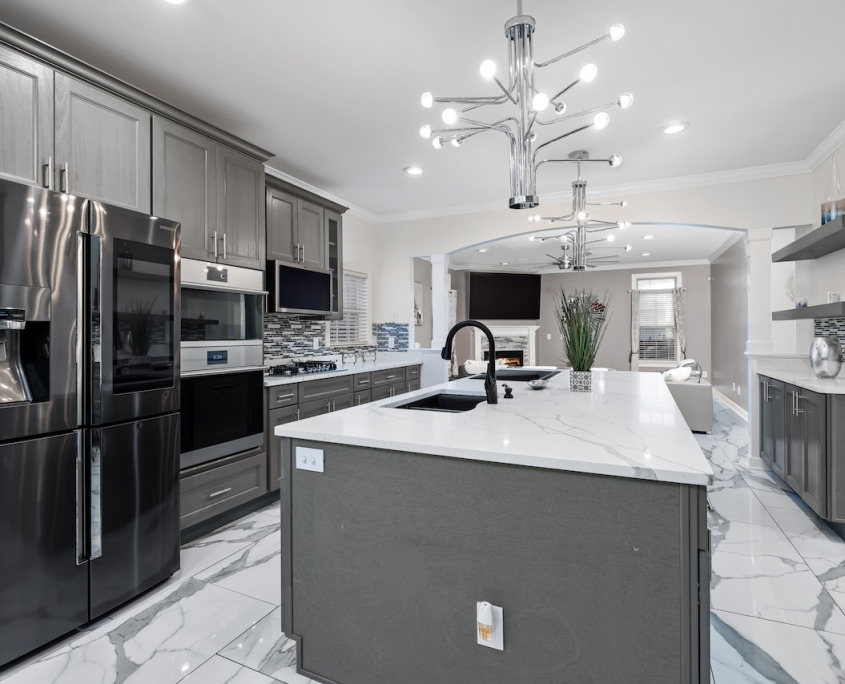
Granite Countertop Price
Granite countertop prices vary significantly based on factors such as slab thickness, edge profile, intensity of color, and installation complexity. On average, they can range anywhere between $40 and $100 per square foot, with customization and high-end features potentially increasing the cost. Still, granite countertops are less expensive than quartz countertops on average. However, granite needs more maintenance, like additional, regular sealing, which increases its price over time.
FAQ on Quartz vs Granite
- Is quartz better than granite?
Whether quartz is better than granite depends on the homeowner’s specific needs and preferences. Quartz offers advantages such as durability, resistance to stains and scratches, and low maintenance due to its non-porous surface. It also provides extensive customization options in terms of colors, patterns, and uniformity. However, some may prefer the natural and unique aesthetic of granite, which makes a kitchen one of a kind. Granite is exceptionally heat-resistant and can withstand high temperatures, making it suitable for avid cooks. Ultimately, the choice between quartz and granite comes down to a specific lifestyle, budget, and aesthetic preferences.
- Is quartz harder to maintain than granite?
In general, quartz is easier to maintain than granite. Quartz countertops are non-porous, which means they do not require sealing like granite does. This makes them highly resistant to stains and bacterial growth, simplifying cleaning routines. Granite, on the other hand, needs periodic sealing to maintain its stain resistance. While both materials can withstand everyday wear and tear, quartz is less prone to chipping and scratching due to its engineered composition. However, quartz can be more sensitive to extreme heat, so it’s essential to use heat-resistant pads or trivets to prevent damage from hot cookware, a consideration that may add a level of maintenance compared to granite’s exceptional heat resistance.
- Does quartz scratch more easily than granite?
Quartz is generally more resistant to scratches than granite due to its engineered composition. Quartz countertops are made by combining natural quartz crystals with resin and pigments, creating a dense and uniform surface that is highly resistant to scratching. Granite, on the other hand, is a natural stone with variations in hardness depending on its mineral composition, making it more susceptible to scratching, especially by sharp objects or knives. However, while quartz is less prone to minor scratches, it can still suffer damage under extreme pressure or force. So, while both materials are durable, quartz tends to offer better scratch resistance in everyday use, but proper care should still be taken to avoid heavy impact or abuse.
- What is the main difference between quartz and granite?
The main difference between quartz and granite lies in their composition and formation. Quartz countertops are engineered using a combination of natural quartz crystals, resins, and pigments, resulting in a non-porous surface that doesn’t require sealing. On the other hand, granite countertops are cut from natural stone slabs, making them porous which is why they need regular sealing to maintain their stain resistance. Another significant difference is their appearance. Quartz offers a consistent look with a wide range of colors and patterns, while granite showcases natural variations in color, veining, and texture, ensuring that each slab is unique.
- Is quartz or granite more expensive?
Quartz is typically more expensive than granite. The price of quartz countertops can range from $60 to $150 per square foot, while granite countertops generally come in at a lower initial cost range of $40 to $100 per square foot. However, the overall cost depends on factors like the brand, color, and complexity of the installation, which can influence the final price for both materials. But while quartz may have a higher upfront cost, it often requires less maintenance and sealing than granite, which leads to cost savings over time. Also, the durability and longevity of both materials can impact the overall value they provide for their respective costs.
- Which material, quartz or granite, is more durable?
Quartz and granite are both highly durable materials, but they have different characteristics when it comes to durability. Quartz countertops are engineered to be extremely durable, and resistant to scratches, stains, and acids due to their non-porous surface. They are less prone to chipping or cracking, making them ideal for high-traffic areas. Granite, being a natural stone, is also durable and exceptionally heat-resistant, making it also highly fitting for kitchens. However, granite is more porous and requires regular sealing to maintain its stain resistance. While both materials are resilient and durable, the choice between quartz and granite often depends on specific usage patterns, maintenance preferences, and aesthetic considerations.
- Are quartz countertops easy to maintain?
Yes, quartz countertops are easy to maintain. Their non-porous surface makes them highly resistant to staining, which means they don’t require regular sealing like natural stones such as granite or marble. Routine cleaning with mild soap and water, using a soft cloth is usually sufficient to keep them looking their best. Unlike granite, quartz countertops are not as susceptible to bacterial growth or staining from spills, making them a hygienic and low-maintenance option. However, while they are resistant to stains and scratches, quartz can still be damaged by excessive heat, so using heat-resistant pads or trivets for hot cookware is advisable to maintain their pristine appearance and longevity. Overall, the minimal maintenance requirements make quartz countertops an attractive choice for many homeowners.
- Do granite countertops need to be sealed regularly?
Yes, granite countertops need to be sealed regularly to maintain their stain resistance, great looks, and durability. Granite is a porous natural stone, which means it can absorb liquids and stains over time if not properly and regularly sealed. The frequency of sealing can vary depending on the specific granite type and the sealant used but is usually recommended annually. Sealing helps create a protective barrier on the surface, preventing liquids, oils, and other substances from penetrating the stone. Regular sealing also helps maintain the granite’s appearance and extends its lifespan. Failing to seal granite countertops can result in permanent stains and diminished overall performance, so it’s an essential part of maintenance for this natural stone surface.
Choose The Right Countertop with Home Art Tile Kitchen & Bath Pros
If you’re planning on remodeling or building your kitchen from scratch, make sure to stop by our kitchen countertop outlet in Queens, NY. We are continuously monitoring and tracing for you the hottest trends in kitchen countertops, especially quartz and granite, and other kitchen trends. Visit us, check out what we offer, and save thousands compared to Manhattan kitchen countertop stores.
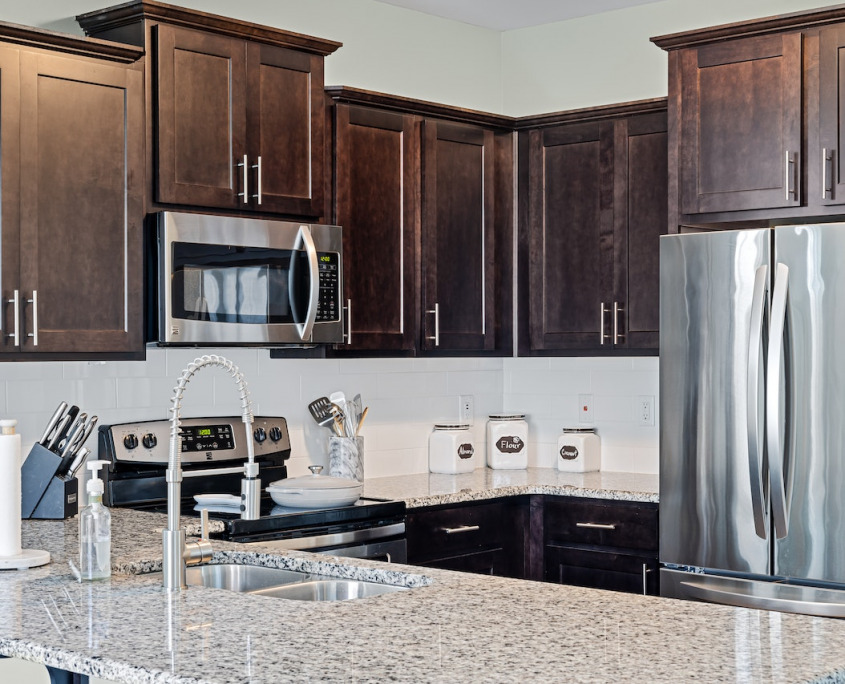
Whether granite or quartz countertops are close to your heart and mind, it’s easy to choose one kind or two that fit best with your aesthetic preferences, now that you’ve explored them in detail. If you’re going to remodel a kitchen in Queens, Long Island City, Brooklyn, or Manhattan, both granite and quartz countertop styles will fit your needs and wishes. The choice will be determined by the fact of which kind you prefer.
At Home Art Tile Kitchen & Bath, we believe that there is a suitable countertop material and style in our selection for all of our customers. You can book a free design consultation and browse our extensive kitchen countertop selection at our Long Island City, NYC showroom today! Contact us today to start the process.
Conclusion
Choosing the right countertop — granite or quartz — for your kitchen is an important decision that can greatly impact the overall aesthetic and functionality of the cooking space. These two popular countertop options are the ones that homeowners most commonly consider. Both materials offer unique benefits and have distinct characteristics that make them suitable for different preferences and lifestyles.
The choice between quartz vs granite countertops depends on your individual style preferences, budget possibilities, and maintenance considerations. Both materials have unique characteristics that make them suitable for different lifestyles, maintaining possibilities, and design preferences. By weighing the pros and cons of each kind, you will be able to make an informed decision that aligns with your needs and aesthetics.
So, whether you lean towards the engineered allure of quartz or the natural charm of granite, rest assured that your choice will define the character of your space for years to come.

